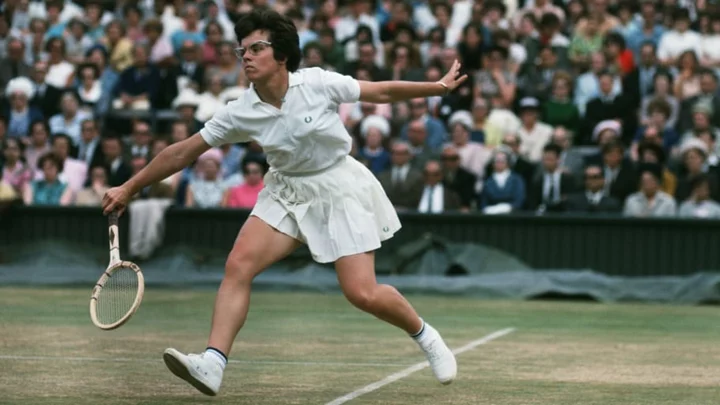Billie Jean King engraved her name in history as one of tennis’s best athletes in the 1960s and ‘70s. But she also distinguished herself by championing gender equality efforts in tennis as she rose to fame. In addition to growing into one of the sport’s most celebrated athletes, King also made significant strides to level the playing field for women. She rallied for equal pay and fair treatment—all while demonstrating that women’s sports are just as competitive as men’s. Here are some facts about one of the most important women in sports history.
1.Billie Jean King didn’t start playing tennis until she was 11 years old.
While many athletes begin playing sports as young children, King didn’t play her first game of tennis until a friend took her to a country club when she was 11. She fell in love with the sport immediately and quickly purchased her own tennis racket. King then began to spend her free time on Long Beach’s public courts, where they offered free tennis lessons. She played her first Grand Slam at the 1959 U.S. Championships when she was only 15 years old .
2. She won her first Wimbledon title in 1961.
King won her first Wimbledon title in 1961—just two years after her Grand Slam debut—by snagging the top spot in the doubles championship with Karen Hantz. She went on to become a Wimbledon singles champion in 1966, 1967, 1968, 1972, 1973, and 1975.
3. King is the first woman to win U.S. singles titles on all four surfaces.
There are four main types of tennis surfaces people can play on: grass, carpet, clay, and the hard court. In 1974, King made history and became the first woman to win U.S. singles titles on all four surfaces.
4. A college denied her a tennis scholarship because of her gender.
King earned her first Wimbledon win—the 1961 doubles championship—when she was in college. Despite that incredible feat, she was denied a tennis scholarship at Los Angeles State College (now California State University, Los Angeles) because she was a woman.
5. King received $15,000 less than the male winner of the 1972 U.S. Open.
In 1972, King won the women’s singles at the U.S. Open—yet she received $15,000 less than the winner of the men’s singles. She then began to openly criticize the difference in pay, threatening to boycott the sport forever; the following year, the U.S. Open offered equal prize money to both men and women.
6. King is the first woman Sports Illustrated named SportsPerson of the Year.
King set another record by becoming the first woman to be chosen as Sports Person of the Year by Sports Illustrated in 1972; she and UCLA coach John Wooden earned the title that year. Up until that point, only men had graced the cover of the publication. “Getting the Sportsperson of the Year in 1972 was so personal for me because of Title IX. That's what it meant for me, that times-were-a-changing, as Dylan sang in those times,” King later said. “Sports are a microcosm of society, so it was huge. I'm not sure SI even thought about it, but, boy, I sure did.”
7. King founded and led the Women’s Tennis Association.
King continued her efforts to foster equality in tennis by establishing and leading the Women’s Tennis Association (WTA). The organization is in charge of the WTA Tour—an international professional women’s tennis tour—and is the main governing body for women’s tennis. King was the WTA’s first president; she served in the role from 1973–1975, then from 1980–1981.
8. King won the Battle of the Sexes in 1973.
In 1973, King defeated tennis player Bobby Riggs in the Battle of the Sexes. Riggs was a self-proclaimed male chauvinist: He claimed women’s tennis was inferior, and believed he was capable of surpassing any woman’s tennis ability no matter his age. King proved him wrong when she played him in the historic match. She was 29, Riggs was 55. The match was broadcast to over 90 million people. “To beat a 55-year-old guy was no thrill for me. The thrill was exposing a lot of new people to tennis,” King said.
9. King was inducted into three Hall of Fames.
King retired from tennis in 1984, but her legacy has continued to loom large over the sport long after she left the court. In 1980, she was inducted into the Women’s Sports Hall of Fame. In 1987, she was honored by being inducted into the International Tennis Hall of Fame. And, finally, she was recognized in 1990 by being inducted into the National Women’s Hall of Fame.
10. She became a global mentor for UNESCO.
King’s influence extends far beyond the tennis court. In 2008, she was appointed the Global Mentor for Gender Equality by UNESCO, where she continued her mission to equalize the playing field.
11. King is the first woman athlete to receive the Presidential Medal of Freedom.
The following year, King received the Presidential Medal of Freedom, the highest civilian honor a person may be granted. She became the first woman athlete to recieve the medal. "We honor what she calls all of the off-the-court stuff, what she did to broaden the reach of the game, to change how women athletes and women everywhere view themselves, and to give everyone, regardless of gender or sexual orientation, including my two daughters, a chance to compete both on the court and in life,” President Obama said.
This article was originally published on www.mentalfloss.com as 11 Facts About Billie Jean King .









